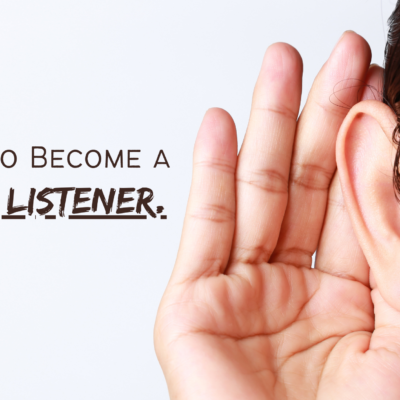Tips to Become a Better Listener: In today’s world, where communication is usually reduced to quick exchanges, the skill of active listening is more useful than ever. Being a good listener is not just about hearing words; it’s about truly understanding the speaker’s message, empathizing with their emotions, and encouraging deeper connections.
Whether in personal relationships, professional settings, or everyday interactions, mastering the art of active listening can greatly improve communication and relationships. So, here we are giving some useful tips to help you become a better listener.
Also Read:
- How to Stop Letting Your Emotions Control You?
- Top Strategies for Dealing with Negative Emotions.
- How To Get Over Your Insecurities and Jealousy?
- I Am Afraid To Be Alone- Causes and Prevention Tips.
- What Are Long Term Physical Effects of Stress and its Preventions.
Tips to Become a Better Listener:
Give Undivided Attention
One of the most significant parts of active listening is providing your full attention to the person you are talking to. This means keeping the distractions such as phones, laptops, or other devices away, and concentrating entirely on the person who is speaking.
Make eye contact and use body language to indicate that you are engaged and receptive to what they are saying. By stopping distractions and showing real interest, you create an atmosphere where the speaker feels valued and appreciated.
Practice Empathy
Empathy is the capability to understand and share the feelings of another person. When practicing active listening, it’s important to put yourself in the speaker’s shoes and try to see things from their viewpoint. This includes not only listening to their words but also paying attention to their tone of voice, body language, and emotions. By empathizing with the person you are talking to, you will better understand their experiences and also you will be able to respond with compassion and understanding.
Avoid Interrupting
Interrupting is a common obstacle to effective communication. It can disrupt the flow of conversation, make the speaker feel unheard, and restrict your ability to completely understand their message. Instead of interrupting, practice patience and permit the speaker to express themselves completely before responding. If you feel the urge to say something, take a moment to pause and let the speaker finish their thought before offering your input.
Ask Open-Ended Questions
Asking open-ended questions is a strong way to encourage the speaker to elaborate on their thoughts and feelings. Instead of asking yes or no questions, which can limit the conversation, try asking questions that invite the speaker to deliver more detailed reactions. This not only indicates your interest in what they have to say but also enables deeper thought and understanding.
Paraphrase and Summarize
Paraphrasing and summarizing are processes that involve restating the speaker’s message in your own words. This indicates active listening by showing that you are paying attention and trying to understand the speaker’s viewpoint.
It also allows the speaker to clarify any misunderstandings and provides that both parties are on the same page. By paraphrasing and summarizing, you can strengthen your understanding of the speaker’s message and support the overall connection.
Pay Attention to Nonverbal Cues
Nonverbal communication, such as facial expressions, gestures, and posture, can communicate a prosperity of information about a person’s thoughts and feelings. When practicing active listening, pay close attention to the speaker’s nonverbal cues, as they can provide a valuable understanding of their emotions and intentions.
By following these cues, you can better understand the underlying meaning behind the speaker’s words and react with greater empathy and sensitivity.
Try To Be Patient and Supportive
Effective listening requires patience and support. It is important to give the speaker the time and space they need to express themselves fully without feeling judged. Avoid jumping to conclusions or making assumptions, and instead, stay open-minded to the speaker’s viewpoint.
Give words of encouragement and validation to show that you value their thoughts and feelings and are committed to understanding them completely.
Practice Mindfulness
Mindfulness includes being completely present in the moment and aware of your thoughts, feelings, and surroundings. By practicing mindfulness during conversations, you can develop greater focus and concentration, permitting you to listen more effectively.
Take deep breaths, center yourself, and let go of any distractions that may hinder your ability to listen attentively. By being completely present, you can create a more in-depth connection with the speaker and promote more meaningful communication.
Seek Feedback
Seeking feedback is an important part of becoming a better listener. Ask the speaker for their thoughts on how well you listened and whether there are any areas for improvement. Be open to productive criticism and use it as an opportunity to learn and grow.
By actively seeking feedback, you can acquire valuable insights into your listening skills and make adjustments as required to become a more influential communicator.
Practice Active Listening Daily
Like any skill, active listening needs practice to be mastered. Make a conscious effort to practice active listening in your daily interactions with friends, family, and colleagues. Pay attention to your listening habits and seek to include the tips mentioned above in your discussions. Over time, you will find that active listening becomes more natural, leading to deeper connections and more meaningful relationships.
At The End
Active listening is a powerful skill that can improve communication, promote empathy, and strengthen relationships. By following the above-mentioned points you can become a better listener and create more meaningful connections with those around you. So, the next time you find yourself in a conversation, remember these tips and aim to listen with intention, compassion, and understanding.








